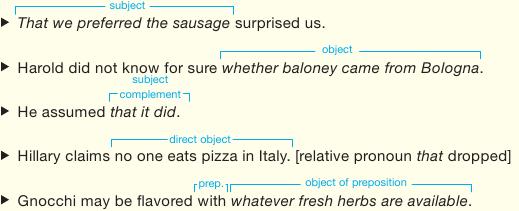R2-b Dependent Clauses
subject The part of a clause that identifies who or what is being discussed.
predicate The part of a clause that includes a complete verb and describes the action or state of the subject.
Like independent clauses, all dependent clauses have a subject and a predicate. Unlike independent clauses, however, dependent clauses cannot stand by themselves as complete sentences; they always occur with independent clauses as part of either the subject or the predicate.
| INDEPENDENT | Ribbon-shaped pasta is popular in northern Italy. |
| DEPENDENT | . . . , while tubular-shaped pasta is popular in southern Italy. |
| . . . , which is generally made by hand, . . . | |
| Although it originally comes from China, . . . |
There are three types of dependent clauses: adjective, adverb, and noun.
Adjective clauses Also known as relative clauses, adjective clauses modify nouns and pronouns in independent clauses. They are introduced by relative pronouns (who, whom, which, that, whose) or adverbs (where, when), and most often they immediately follow the noun or pronoun they modify. Adjective clauses can be either restrictive (essential to defining the noun or pronoun they modify) or nonrestrictive (not essential to understanding the noun or pronoun); nonrestrictive clauses are set off by commas, and restrictive clauses are not (see P1-c and P2-b).
- Vincent bought a package of agnolotti, which is a pasta used in soup.
- We went back to the restaurant where they serve that delicious veal.
- Everyone who likes Italian cooking knows Romano cheese well.
Adverb clauses Introduced by subordinating conjunctions (such as although, because, and since), adverb clauses nearly always modify verbs in independent clauses, although they may occasionally modify other elements (except nouns). Adverb clauses are used to indicate a great variety of logical relations with their independent clauses: time, place, condition, concession, reason, cause, circumstance, purpose, result, and so on. They are generally set off by commas.
- Although the finest olive oil in Italy comes from Lucca, good-quality olive oil is produced in other regions of the country. [concession]
- When the tomato sauce comes to a boil, reduce the heat and simmer. [time]
- If you know mushrooms, you probably prefer them fresh. [condition]
- Ken carefully watches the spaghetti because he does not like it to be overcooked. [reason]
independent clause A word group with a subject and a predicate that can stand alone as a separate sentence.
Noun clauses Like nouns, noun clauses can function as subjects, objects, or complements (or predicate nominatives) in independent clauses. They are thus essential to the structure of the independent clause in which they occur and so, like restrictive adjective clauses, are not set off by commas. A noun clause usually begins with a relative pronoun, but the introductory word may sometimes be omitted.
